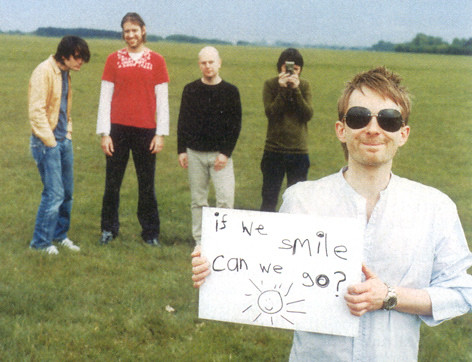
Genius at work, in the background...
In recent photos of Radiohead, Colin has often been seen behind the lens of a small digital camera himself, taking pictures of the other band members mid-photoshoot. As their apparent unofficial off-stage photographer, Colin has provided fans with an insider’s view of the band at work on album seven in their studio via his posts to Radiohead’s blog, Dead Air Space. Images from 2005 were captured with a Canon PowerShot S70, while images posted after the new year (2006) were shot with the Panasonic DMC-LX1 that perhaps Colin received for Christmas.
“They’ve taken to calling me Dave Bailey,” he says, mock-aggrieved. “Not even David Bailey, but Dave Bailey. They won’t be laughing this time next year when my exhibition hits the galleries of Europe.”
“Yes we will,” says Ed O’Brien, guitarist, placing a line of tobacco onto a small rolling paper.
“Oh, that’s right. You will, won’t you? What was I thinking of?”
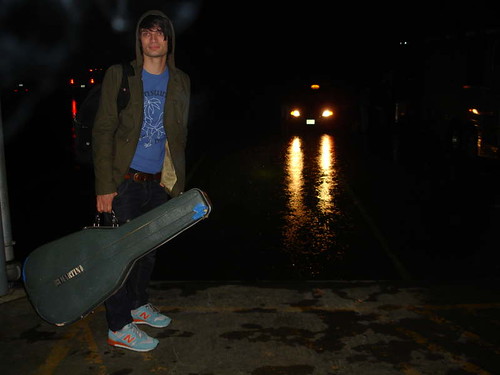
A typical Dead Air Space photo posted by Colin
In May 2003, Colin discussed his favorite images in the V&A’s photography gallery, a collection
ranging from early daguerreotype and calotype prints through to modern digital prints,as part of their accompanying website’s “personal tours.” Here’s an excerpt of what he had to say:
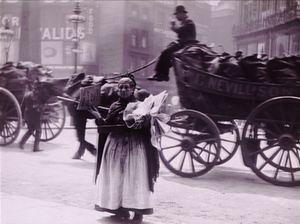
Magazine Seller, Ludgate Circus, 1900
Paul Martin, 1864 - 1942
Platinum print
“I think if I was to think about these pictures any more than the first impression this would probably be one of my favourites just because of the whole concept of time being captured and time escaping from the image. If you look at this picture the only two people standing still are the person behind the camera and the woman selling the newspapers, whilst everything around her is moving. So there is this idea that the photograph is trying to capture time and the newsprint is trying to capture time or capture moments whilst everything else is moving, whilst time is moving on and is escaping its attempt to be captured. There are blurred images behind this woman as well. You know the doughty nature of her and the size of her — like this rock — and it’s taken in the middle of London as well, Ludgate Circus, and everything is going around and around. If I could see the image any clearer I could find out what the news title was saying. But ultimately the idea that it’s all basically unimportant because time marches on. So this is probably one of my favourite images.”
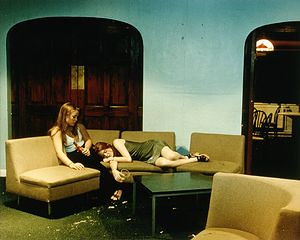
Untitled, May 1997
Hannah Starkey, born 1968
C-type print
“Well, of course, this is a very typical scene for me. I’m in a band called Radiohead and this is like after the show — the Radiohead dressing room and some of the fans come back to room to see the band, and of course the band have all gone home as early as possible. The light is very similar to that kind of thing. It’s a very hard light and there’s a general mess all over the floor. Of course they’ve made this mess — we would always clean up the mess after we’ve made it. This is a kind of place where I spend a lot of my life, unfortunately — those seventies corner suites pock-marked by cigarette burns and formica table tops and plastic cups spilling out crushed crisps and cigarette ends onto the tacky brown carpet. But saying that this could be someone’s home so I don’t want to be that cruel.”
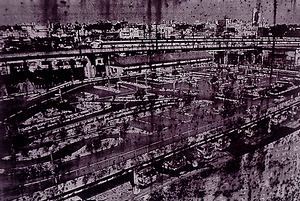
From the series ‘Ravens,’ 1975-85
Masahisa Fukase, born 1954
Gelatin-silver print
“Just seeing this picture straight away by Fukase reminds me of when I was on a bullet train earlier this year in 1998 going past industrial docks, and travelling at up to 200-odd miles per hour in this kind of landscape. Also it looks like it’s been rescued from the bottom of a burnt-out bombed filing cabinet, and it looks like a blue-print as well for some industrial landscape. So for all these reasons I have chosen that.”
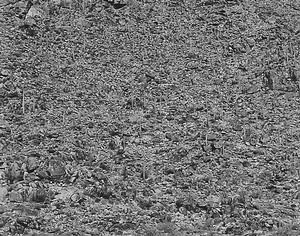
Arizona Landscape, 1943
Frederick Sommer, 1905 - 1999
Gelatin-silver print
“When I first saw this picture the way I was looking at it was on a computer screen and I made the flippant comment that it looks like a desktop-textured screensaver, when in fact it’s an Arizona landscape and there is so much detail in it that you just get lost in it. I think it’s just that the perspective of the picture is such that it’s very hard to discern anything apart from this incredibly dense texture. And again, obviously reminding me of my personal experiences, like riding across the Arizona desert, getting up at six in the morning on the tour bus just to watch this incredible landscape whizz past on these abandoned freeways at that time in the morning.”
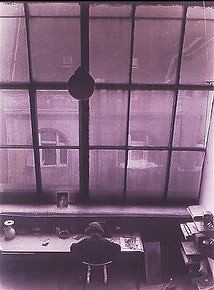
Studio Interior, 1933
Gustav Seiden, 1900 - 1993
Gelatin-silver print
“I love the way the artist is in her ‘atelier’ and the way that the outside is framed by the window, and the rain is running down the window panes. So each of them looks like their own individual photographs as the actual picture of the whole scene is framed.”
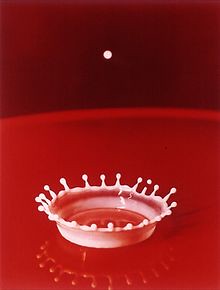
Milk Drop Coronet, 1957, printed later
Harold Edgerton, 1903 - 1990
C-type print
“For some reason I find this picture perhaps the most sinister of any of the pictures in this collection. I think a lot of it is to do with the colours and the gloss. It reminded me of this film called, I think, ‘Twins’ [Dead Ringers] by Cronenberg with Jeremy Irons playing these two sort of gynaecologists, again using these bright reds and white and I suppose the crown image as well. And it also looks like a piece of viscera, the sort of white tubing. So those are the kind of things that I see from this image and I think they are quite disturbing.”
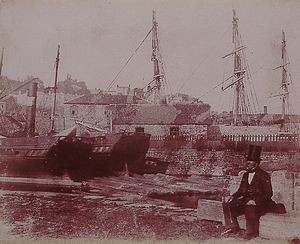
Harbour Scene, c.1845
Calvert Richard Jones, 1804 - 1877
Salted paper print from calotype negative
“This photograph has been taken by Calvert Jones and I like it. It is a harbour scene. The gentleman in the corner looks very unsuited to spending much time by the sea and his clothing looks incredibly incongruous for the scene and also for now. I often wonder when I see pictures like this of Victorian times whether when people look at pictures of us now from 150 years hence they’ll think we’ll be wearing incredibly incongruous clothing for our setting.”
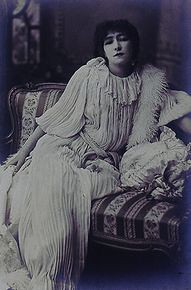
Sarah Bernhardt, c.1890
Walter H Barnett, 1862 - 1934
Platinum print
“This picture by the Australian Walter H. Barnett I like because for a start the clothes that Sarah Bernhardt are wearing — very flowing, pleated materials — of course are reminiscent now of Issey Miyake ‘Pleats Please’ fabrics. And also because it reminds me of one of my favourite books called The Song of the Lark by Willa Cather.”
Check out more photographic “Personal Tours” at V&A Exploring Photography, or see Colin’s latest photos at Radiohead’s Dead Air Space.
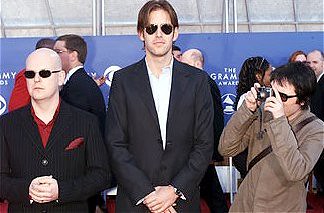
At it again...
RESOURCES FOR THE COLIN WANNA-BE
- Digital Photography School
- Flickr photoset: Dead Air Space — photos by (or at least posted by) or of Colin Greenwood from Radiohead dot com
